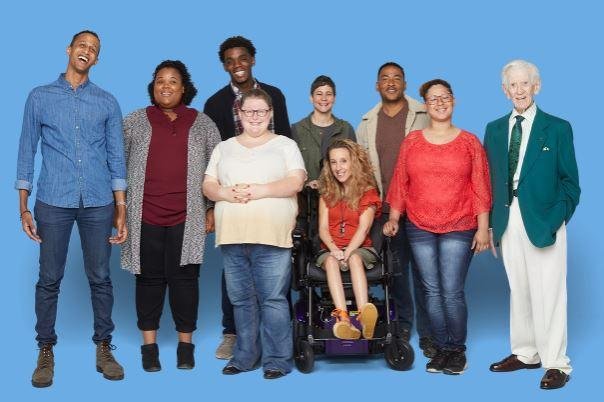The National Institutes of Health is seeking 1 million people of all backgrounds and walks of life to sign up and provide health profiles to a national database focused on the development of personalized, and more effective, medical efforts. Photo courtesy of National Institutes of Health
May 1 (UPI) -- Starting next week, more than 1 million people 18 and older can sign up to be part of a nationwide program to provide detailed health profiles in an effort to advance medical care.
The National Institutes of Health on Thursday announced the official launch date of the All of Us Research Program as Saturday, May 5, with events planned in seven cities across the United States: Birmingham, Ala.; Chicago; Detroit; Kansas City, Mo.; Nashville, Tenn.; New York City and Pasco, Wash.
More than 25,000 participants have already enrolled in All of Us as part of a yearlong beta to get the program up and running, according to the agency.
The NIH said it is especially interested in minority participation as part of an effort to make the database the largest, most diverse resource of its kind. The program will collect different types of health and lifestyle information, including from online surveys and data from electronic health records, including where participants live and work.
"All of Us is an ambitious project that has the potential to revolutionize how we study disease and medicine," Health and Human Services Secretary Alex Azar said in a press release. "NIH's unprecedented effort will lay the scientific foundation for a new era of personalized, highly effective healthcare. We look forward to working with people of all backgrounds to take this major step forward for our nation's health."
NIH has funded more than 100 organizations -- including community groups, health centers, academic medical centers and private companies -- to find volunteers for the database.
The program was first proposed by President Barack Obama during his 2015 State of the Union address, calling it the Precision Medicine Initiative. The program has since been renamed All of Us, in 2016, and earlier this year, the program received a $60 million yearly budget boost to $290 million.
Precision medicine is an emerging approach to disease research, treatment and prevention, and considers differences in people's lifestyles, environments and biological makeup, including genes, to understand and diagnose disease and disease risk.
Participants will provide data over many years, including through surveys, electronic health records, physical measurements, blood and urine samples and wearable technologies. And in future phases, children will be able to enroll.
In March, the NIH issued details on funding genomic centers that receive 100,000 genomes each year, beginning with a 20,000-person pilot later this year.
The Mayo Clinic was recently awarded $142 million over five years by the NIH to serve as the nation's biobank in Rochester, Minn., and Jacksonville, Fla. It plans to store 35 samples from each of the 1 million participants.
Mayo is already inviting patients to volunteer to donate samples, including blood and blood derivatives, and health information regardless of health history. The biobank currently has 27,000 participants, and close to 1 million samples have already been stored.
"Our facility is built to serve as the archive for all biospecimens, storing them under optimal conditions to preserve quality and minimize loss, damage or contamination, and will be able to retrieve them efficiently for distribution," Dr. Mine Cicek, co-principal investigator at Mayo's Center for Individualized Medicine, said in a press release.
The Scripps Translational Science Institute will seek participants through partnerships with Walgreens, Blue Cross Blue Shield Association, National Blood Collaborative, Quest Diagnostics and other organizations.
"All of Us represents a far-reaching initiative for what's possible in medical research today and in the future -- how each individual can generate useful data about their own health and what makes them tick," Dr. Eric Topol, director of STSI and a professor of molecular medicine at The Scripps Research Institute, said in a press release.
Henry Ford Health System, which has received a $60 million NIH funding over five years for its role in All of Us, is planning a public event from 1 p.m. to 5 p.m. on May 6 at Ford Field in Detroit to raise awareness and enroll people in the program.
"This is unlike anything we've done before in healthcare science, and it will keep the United States at the forefront of medical research," Dr. Christine Cole Johnson, who heads Henry Ford's Department of Public Health Sciences, said in a press release. "The findings may enable doctors to specifically tailor recommended treatments to prevent or cure diseases or illnesses that will be known, ahead of time, to be effective for that specific individual patient."
The All of Us program is the brainchild of Eric Dishman, a former Intel executive and cancer survivor.
At 19, Dishman was diagnosed with a rare form of kidney cancer. He underwent more than 50 rounds of chemotherapy and radiation over two decades that he later found out were "never destined to work."
Ultimately, his cancer was cured when doctors sequenced his genome and then prescribed a pancreatic cancer drug. He then received a kidney transplant.
"I'm alive today because of precision medicine, and I think everyone deserves that same opportunity no matter the color of your skin, your economic status, your age or your sex or gender," Dishman said. "In other words, it will truly take all of us."















